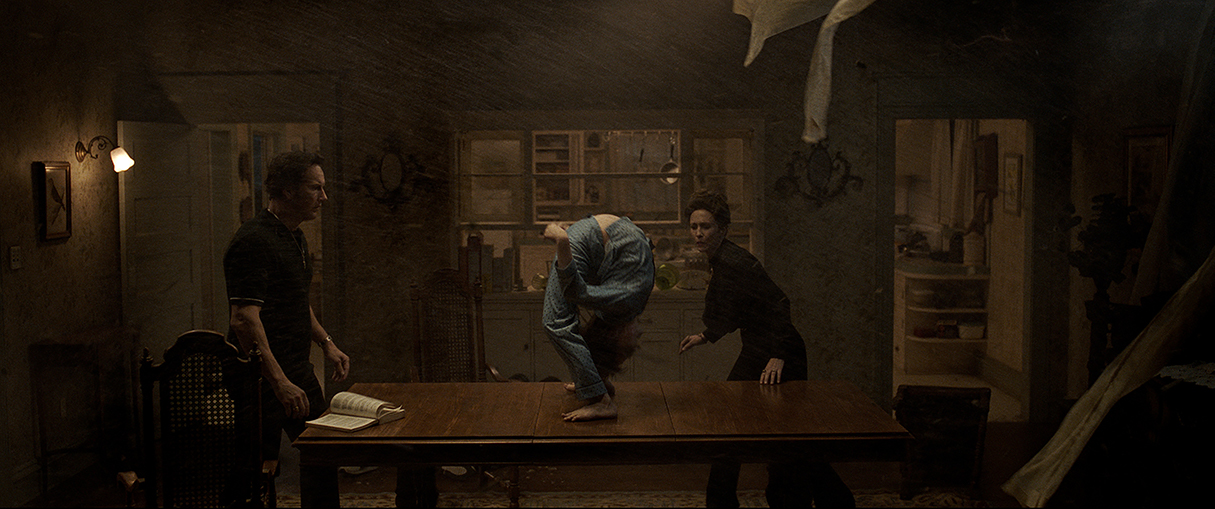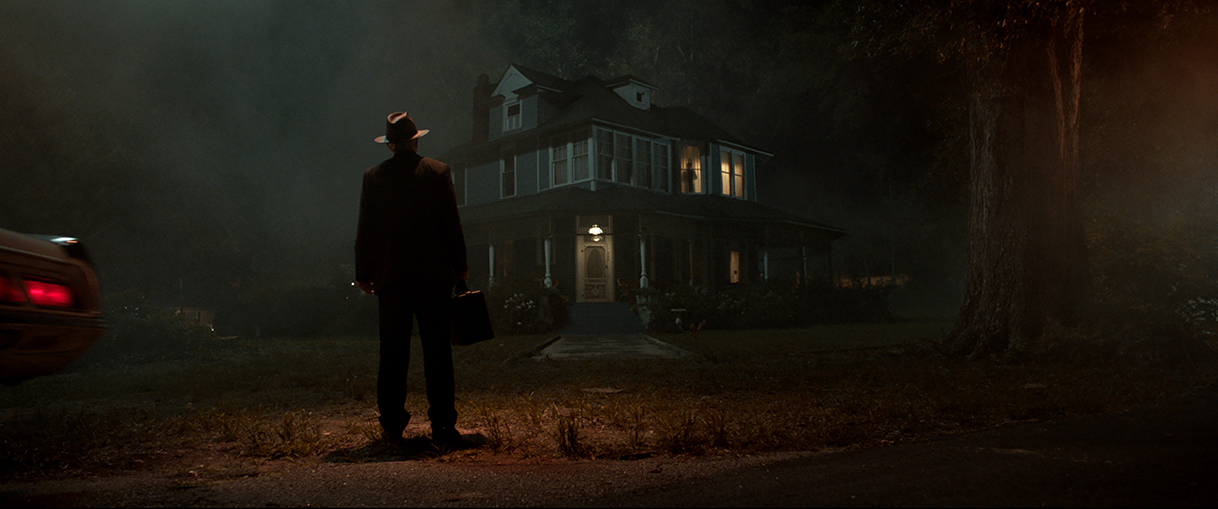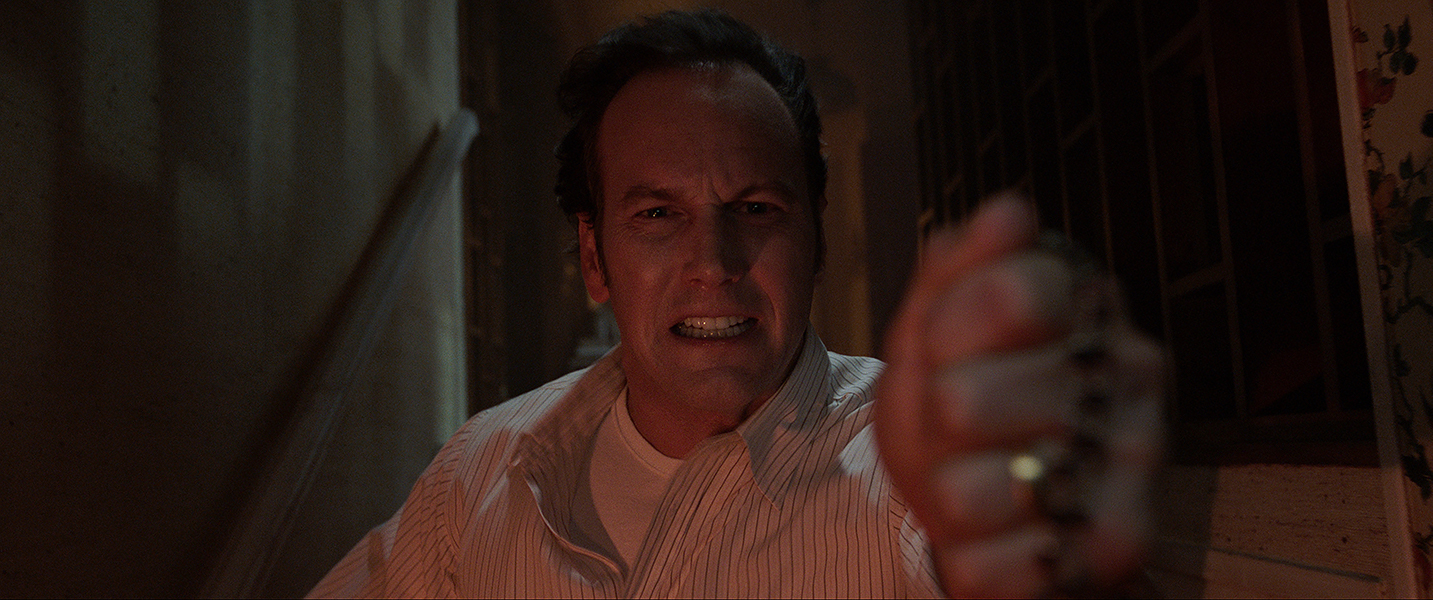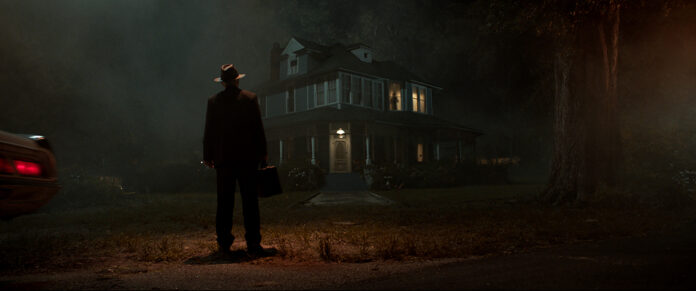“The Conjuring: The Devil Made Me Do It” reveals a chilling story of terror, murder and unknown evil that shocked even experienced real-life paranormal investigators Ed and Lorraine Warren. One of the most sensational cases from their files, it starts with a fight for the soul of a young boy, then takes them beyond anything they’d ever seen before, to mark the first time in U.S. history that a murder suspect would claim demonic possession as a defense.

“The Conjuring: The Devil Made Me Do It” is the seventh film in the “Conjuring” Universe, the largest horror franchise in history, which has grossed more than $1.8 billion worldwide. It includes the first two “Conjuring” films, as well as “Annabelle” and “Annabelle: Creation,” “The Nun,” and “Annabelle Comes Home.”
The film was produced by James Wan and Peter Safran, who have collaborated on all the “Conjuring” Universe films. Chaves directed from a screenplay by David Leslie Johnson-McGoldrick (“The Conjuring 2,” “Aquaman”), story by James Wan & David Leslie Johnson-McGoldrick, based on characters created by Chad Hayes & Carey W. Hayes.
What really sets this ‘Conjuring’ apart and makes it so exciting,’ Director Michael Chaves says, “is that you have all of the scares and the terror that you would expect from a ‘Conjuring’ film, but it is set against this incredible mystery that is tied into what the ‘Conjuring’ universe is all about.”
“Within the first few minutes, you’ll know you’re in for a much different ride than you’ve been on in other ‘Conjuring’ films.” – Patrick Wilson

“We decided to interweave reality with a sort of composite story,” Johnson-McGoldrick explains, “that takes numerous, real-life occurrences that took place in different situations and combines them into one story. We go into a more fictional place in Act II where we’re solving the mystery, but we’re still pulling from the actual interactions that Lorraine had with the police.”
Once that was decided, the next thing to do was figure out how to start things off. The Devil Made Me Do It case, also known as the Brookfield Demon Murder case, has two distinct parts: the torment and possession of David Glatzel, which has been the focus of most interest in the past and for which Ed and Lorraine Warren were called to intervene, and the subsequent torment and possession of Arne Cheyenne Johnson, who challenged David’s demon during his last exorcism while being admonished by Ed not to address it directly.
Months later, Johnson killed his friend and landlord during what he claims was a demonic possession. In the trial that followed, with the support of the Warrens, Arne’s defense claimed he was not guilty by reason of demonic possession, citing two incidents in England where demonic possession was accepted by the courts as a legitimate defense. This was the first time in U.S. history where anyone had attempted to claim demonic possession as a defense. It was rejected by the judge.
This was the part of the story that interested Wan and Johnson-McGoldrick. In order to tell Arne’s tale convincingly, Johnson-McGoldrick embarked on a multi-pronged path of research. The Devil Made Me Do It case was national news. It was a sensational case that everyone was talking about at the time.
“I interviewed Arne Johnson and also Debbie Glatzel,” Johnson-McGoldrick divulges. “The two came out together. It’s always better that way. On the one hand, you are getting the event, finding out what happened, but you’re also starting to get a feel for who these people are. That’s important, because when you have to fictionalize certain elements to make a movie, you still want to replicate what if felt like for them.”
“In the video of the actual Theriault exorcism,” Johnson-McGoldrick reveals, “you can hear Lorraine asking if Ed feels ok because he doesn’t look good. Not long after, he had a heart attack. We opted to bring it in here. So even though Ed’s heart attack didn’t happen during the Glatzel exorcism, it does have its basis in reality.”

In the haunted house, Ed and Lorraine have always been the authority. They’ve been called in to help because of their expertise. They are not out in the world having to prove themselves to people. In “The Conjuring: The Devil Made Me Do It,” it’s different, because Ed and Lorraine now have to try and convince non-religious skeptics in the courts and the police to help them in order to help Arne. They manage to win over Arne’s defense attorney by taking her to the Artifact room. Detective Sergeant Clay is another matter, however.
“The heart of this franchise is Ed and Lorraine’s connection and love,” adds Farmiga, “that’s what makes it stand apart from other horror films. It’s the love story.” For the first time, we see the pair as teenagers in love, at the beginning of their relationship. It’s a moving moment atypical of the average horror film. It has nothing to do with evil, just a simple, beautiful story that grounds not only the movie and these characters, but the “Conjuring” Universe as a whole.
Three of the stalwart recurring characters in the core franchise are Steve Coulter, who plays the Warrens’ official Catholic confidante, Father Gordon; Shannon Kook, the Warrens’ dedicated paranormal investigative assistant, Drew Thomas; and Sterling Jerins, the Warrens’ frequently tormented but steadfast daughter, Judy.
Tipping its hat to one of the most iconic images in horror film history, Father Gordon’s arrival at the Glatzel house in Brookfield mirrors Father Merrin’s arrival at the MacNeil townhome in Georgetown from “The Exorcist.” After being dropped off by a taxi, Father Gordon pauses under a similar streetlamp for a moment, the frame nearly identical, wearing a black fedora and carrying a leather satchel, he looks up at the window where the possessed boy is tucked away, and sees a figure who turns and disappears. Father Gordon then walks resolutely toward the door.
Despite all the old familiar faces, it’s a new case file, a new family and a new nemesis. At the center of this story are the Glatzels, Carl and Judy, played by Paul Wilson, who is Patrick Wilson’s brother, and Charlene Amoia.
The real-life Arne Johnson and Debbie Glatzel never wavered in their commitment to each other over the 41 years since they met. Debbie was his fiercest defender and protector, and it was clear how much he adored her to the very end. They were married in prison while Arne was serving his sentence for first-degree manslaughter, and they remained married until Debbie’s death in 2021. The couple remained close to the Warrens until Ed’s passing in 2006 and Lorraine’s in 2019, and as well their daughter Judy and her husband, Tony Spera.
Discover more from SNAP TASTE
Subscribe to get the latest posts sent to your email.



